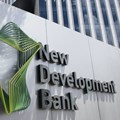Are South Africans too pessimistic and are they missing some positive signals from the debt markets?

Source: Absa Group.
While domestic equity markets have struggled in recent years, the debt markets are demonstrating robustness, innovation and continue to attract demand in the global marketplace. This is important as it speaks to the growth prospects of both South Africa and also the broader African continent.
As one of the leading Pan-African banking groups, we look at activity in the debt markets and believe that there is appetite to unlock funding for large strategic projects which will be transformative for the continent in the coming years.
In the South African context, we have seen a number of new issuers and issuances coming to the market. An example of this was the inaugural bond issuance by the New Development Bank (NDB) in August 2023. Absa was the co-arranger of the deal which saw NDB issue R1,5bn across three- and five-year bonds.
The proceeds will be used to fund infrastructure and sustainable development projects in South Africa.
While we are not yet seeing major Capital Expenditure (Capex) projects being funded by South African corporates, there are a number of corporates re-financing existing debt and putting them in a position to deploy capital.
This has also been supported by a spike in interest in Environmental, Social and Governance (ESG) and sustainability-linked finance projects as organisations invest in energy-security. With the JSE announcing new listings requirements for ESG, we expect this segment of the market to mature and attract new funding.
A range of negative news headlines have cast doubts on the attractiveness of South Africa as an investment destination, but we observe an interesting dynamic when reviewing our discussions between local and international institutional investors. This has been further exacerbated by challenges faced by many of the State-Owned-Entities (SOEs) that are significant players in the debt markets.
Despite challenging conditions, international investors continue to have an appetite for the right South African debt projects. A good example of this would be the Transnet issuance last year. This was a $1bn issuance with a five-year term, listed on the London Stock Exchange – it was 2.9 times over-subscribed and was Transnet’s first international bond issuance in 10 years.
Local vs international optimism
In our interactions with funders, it is interesting to note that local investors tend to be more pessimistic, compared to their international counterparts. It might be argued that South African managers are “closer to the problems” – but we remain encouraged by the demand from international investors.
When it comes to the rest of Africa, the debt markets are maturing rapidly and as we see a combination of innovation and liquidity being added to the market, we expect this to be a catalyst for funding for strategic projects.
Despite challenges presented by the Covid-19 pandemic, the cost-of-living crisis and geopolitical tension across the globe, these markets continue to develop.
Absa was involved in a number of transactions last year which encapsulate this opportunity.
The first was a capital raise for Bayport in Zambia. The corporate debt market in Zambia had been very quiet since 2018 but through our relationships on the ground, strong partnerships with Development Finance Institutions (DFIs) and our understanding of the Zambian market, we were able to ignite the sector with this important deal.
The second was a $200m term loan for the Revolutionary Government of Zanzibar (RGoZ) through its ministry of finance and planning. We acted as mandated lead arranger, underwriter, bookrunner and security agent in the deal.
Catalysing Zanzibar's transformation
The facility to the RGoZ is more than the financing of government projects. It will be a game-changing catalyst for the country’s Development Vision 2050 to achieve an upper medium-income status for the economy.
Being a significant financier of the RGoZ 2023/24 fiscal projects makes us a significant investor and enabler in the improvement and transformation of the lives of the people of Zanzibar through the development of such projects. This includes projects in strategic land, sea and road infrastructure, social services such as health and education, as well as economically transformative sectors such as tourism, the blue economy, agriculture and industralisation.
While there are some that might fear that regional banks are being excluded from some key projects and issuances on the continent – we believe that the opportunity for more transactions will materialise as we continue to provide innovative funding solutions that illustrate our commitment to participate in the growing African story.
The landscape for both public- and private-sector debt is rapidly developing on the African continent and we look forward to utilising our skills, expertise and understanding of the market to create value for our clients.


































